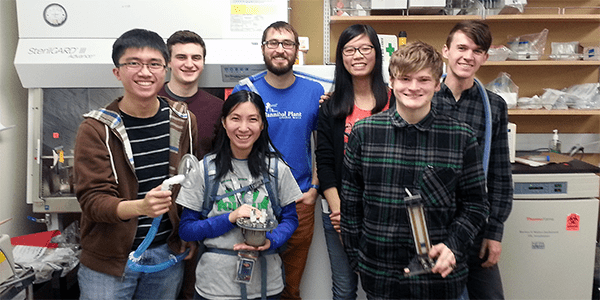UW Bioengineering’s Bioengineers without Borders (BWB) has secured funding from Seattle’s PATH to support continuing work to develop an anesthetic delivery device for low-resource settings. In 2015, the project team received a $30,000 seed grant from UW’s Global WACh-Coulter Foundation partnership.
Most anesthetic delivery devices used today are costly, difficult to transport and require access to reliable power sources, making them unrealistic for use in clinical environments typically found in the developing world. BWB’s Anesthesia Device Team aims to address the challenges impeding use of this critical medical technology by developing an inexpensive portable device that can be used by minimally trained anesthesia technicians.
Since receiving their initial funding, the Anesthesia Device Team within BWB has designed a benchtop test circuit, including a prototype of a simplified anesthetic vaporizer. The test circuit simulates a drawover vaporizer that is used during surgery, and allows the measurement of drug delivery concentration and the temperature drop that occurs within the vaporizer.
They are also refining a 3-D computational model of an anesthetic vaporizer that accounts for the physics of convection, heat transfer and drug evaporation and delivery. The team is currently working on experiments using their test circuit to validate their computational model and inform their vaporizer design.
Since starting their project, the team has partnered with PATH to advance their project, and they received a 6-month grant from PATH’s Health Innovation Portfolio (HIP). HIP funding supports the development of innovative technology-based solutions that address problems in primary and preventive health care in low-resource settings.
In addition to supporting the team’s continued benchtop experimentation, the new grant from PATH will fund an initial proof-of-concept study. The team will work with PATH to survey stakeholders and end-users in Uganda to better understand the programmatic and clinical feasibility of an improved vaporizer. PATH will also assess the commercialization potential of the device, and provide technical support to the UW team for device design and prototype manufacturing.
The student-led project’s principal investigators include UW Bioengineering’s Dr. Wendy Thomas and UW Anesthesiology’s Dr. Anthony Roche. The team also has received support from Dr. Robb Glenny and staff scientist Wayne Lamm of UW Pulmonology. The student team includes BioE Ph.D. students David Peeler and Eric Swanson, undergraduates Michael Butler, Kim Hua, Divya Lakshmanan, Timmy Lee, Madison Molitor, Gabby Pang, Conner Pitts, Minghui Shi, Kaleb Smith, Philip Walczak, and recent M.S. graduate Mallory Monahan.
Bioengineers without Borders is a student organization that aims to develop low cost, sustainable medical technologies while providing students with engineering design experience and professional development. Learn more about Bioengineers without Borders (opens in new window).
PATH is an international nonprofit global health organization that supports emerging and persistent global health challenges, including access to health technologies, family and reproductive health, immunization, HIV, malaria and tuberculosis. Learn more about PATH (opens in new window).


